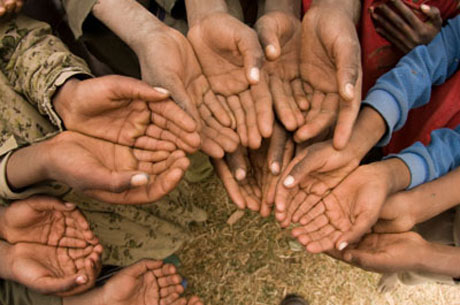
Money and Charity
Paul and Katia debate the merits of giving money to charity
Katia: Well, Paul, it's a difficult question because you really want to help people, but I always question myself where if the money really gets to where it's supposed to go, so personally I rarely do give money to charities. I'd rather give my time, so I know if it's actually something happening. What about you?
Paul: Yeah, I guess that makes sense. If it's a registered charity then I don't see there's a problem really with giving a donation.
Katia: Yeah, I guess so, but really I wonder. There are so many charities in the world, and you wonder really how much money do the people actually get, so it's difficult to really know.
Paul: How about if you're walking down the street and you see a homeless person asking for money?
Katia: Homeless people! That's also difficult because you can see they need money or they need food. Sometimes I feel if you give money, you are supporting their way of life so I would rather give some food so they can eat, but maybe if it's a disabled person, I am more willing to give, rather than just the homeless.
Paul: Yeah, I'd agree with you. It's difficult to know what they're gonna use the money for, so usually I never give money to men but if it's like an elderly woman, I'm happy to give a small donation.
Katia: Why not men and only women?
Paul: Well, going back to what you said about supporting their way of life, I mean, not in every case, but I think that often it can just be man's choice to be homeless on the street and he does have a chance to get a job I think.
Katia: So you think the woman really doesn't have a choice, and the man...
Paul: I think it's more difficult for a woman.
Katia: Possibly. Possibly. That's a difficult question.
Paul: For sure. Do you give money if you see children on the street?
Katia: Well, it depends, because that's also giving money to children so they can continue asking for money, so I avoid it. I also avoid it. What about you?
Paul: I'm a little bit reluctant to give money. I heard in a lot of poor countries that it can actually even be a business, like a parents will send their children onto the street.
Katia: Unfortunately, that's true.
Paul: OK, so maybe you like what you said before: it's better to donate your time than to donate money.
Katia: Possibly. And hopefully things will change.
question myself

I always question myself.
When we 'question ourselves,' that means that we are not sure if we are making a good decision. Notice the following:
- I question myself too much.
- My boss is super confident. She never questions herself.
makes sense

I guess that makes sense.
When something 'makes sense,' that means we understand and agree. Notice the following:
- His suggestion really makes sense.
- The teachers explanation didn't really make sense.
a registered charity

If it's a registered charity then I don't see there's a problem giving a donation.
A 'registered charity' is an official group or organization that gives money, food, shelter or healthcare to the poor. Notice the following:
- They did a charity concert for cancer research.
- She works with a registered charity on weekends.
supporting their way of life

I feel if you give money, you are supporting their way of life.
When we 'support someones way of life,' that means we help them live as they choose. Notice the following:
- The villagers depend on tourism to support their way of life.
- Fishing alone no longer supports their way of life.
a disabled person

If it's a disabled person, I am more willing to give.
'Disabled people' might not have the physical or mental abilities of most people. Notice the following:
- Traveling is often more difficult for a disabled person.
- In the US, most 7-11 stores have a parking space for a disabled
person.
reluctant

I'm a little bit reluctant to give money.
When we are 'reluctant' to do something, that means we do not want to do it. Notice the following:
- I'm reluctant to study abroad. It's too expensive.
- Many people are still reluctant to shop online.
Vocabulary Quiz
supporting • disabled • reluctant


















